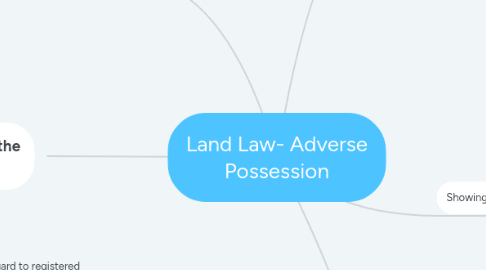Land Law- Adverse Possession
by Bella Troy-Williamson

1. Adverse possession
1.1. Hughes V Griffin, possession will not be adverse if it is enjoyed with consent of the paper title holder i.e through tenancy of license. However, some evidence to suggest that AP can reject permission and still remain in adverse possession i.e Smith & ors V Molyneux. In some cases, a license may be implied in the place of AP.
2. Adverse possession under the 2002 LRA
2.1. Altered the law due to policy reasons. Said existing law was justifiable in relation to unregistered land but not to registered land. The limitation act was misapplied and instead sch 6 of the LRA 2002 applies to registered land cases. Can claim if in AP for 10 years BUT must contact land register, land register contact owner, owner has 65 days to lodge counter notice, AP application will be rejected if counter notice launched unless exceptions apply.
2.2. Exceptions 1)Unconscionable because of estoppel for registered proprietor to dispossess the applicant (Rare, surely only arises where some permission given?) 2) Where the applicant is for some other reason entitled to be registered (i.e administrative error) 3) Where there is a boundary dispute concerning adjoining land, C has reasonably believed for at least 10 years that land is theirs (some uncertainty as to how quick action should be launched after belief ends, Zarb V Perry; I AM Group ltd V Choudrey)
3. Problems w/the new law
3.1. Clearly makes claims in regard to registered land exceptionally hard. Perpetuates the idea of the criminal squatter and the innocent land owner, not necessarily accurate in context of the number of empty homes in England and the number of people in temporary accommodation.
3.2. LASPOA s.144 criminalises squatting in residential buildings, submission to the LRA can now be used as evidence of commission of a criminal offence. This is problematic, especially with cases suggesting this will not affect the ownership.
4. What is Adverse possession?
4.1. A root of title. The person who takes adverse possession acquires a new LFS. In principle, due to relativity of title, the earlier LFS is best. The first LFS owner retains the right to evict the new possessor in order to regain possession and can seek court help to do this. However, it becomes complicated as, there is a limit on how long someone will hold the better LFS for. Under the old law after 12 years the right to recover and the title in the land would be extinguished due to s.15 of the limitations act. The AP then becomes the owner. The position has, however, changed under s.32 of the LRA 2002.
4.2. The default position is that owner is in possession, even if not using the property. To override this the AP must show that they are A)in possession and that B)Said possession is adverse.
5. Showing possession
5.1. 1)Sufficient degree of physical custody and control (Factual possession) i.e dealing with the land in question as an occupying owner might be expected to and no one else has done so as per Powell V McFarlane. Conduct needed will vary according to nature of land in question. Use by title owner will prevent a finding of AP as per Bligh V Martin.
5.2. 2)Intention to possess. Not intention to own, only need to intend to possess for the time being not for the future. Does not matter if there is mistaken belief as to ownership as per prudential assurance co ltd v Waterloo. Proof of intent will usually be inferred from the act of claimants but, in some cases evidence may be against this Inglewood investment co ltd V Baker


